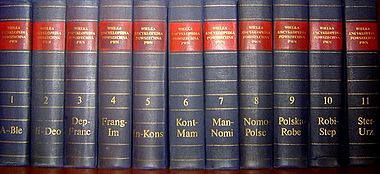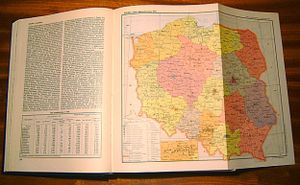
Wielka Encyklopedia Powszechna PWN
Encyclopedia

Poland
Poland , officially the Republic of Poland , is a country in Central Europe bordered by Germany to the west; the Czech Republic and Slovakia to the south; Ukraine, Belarus and Lithuania to the east; and the Baltic Sea and Kaliningrad Oblast, a Russian exclave, to the north...
encyclopedia
Encyclopedia
An encyclopedia is a type of reference work, a compendium holding a summary of information from either all branches of knowledge or a particular branch of knowledge....
ever written. It was published between 1962 and 1970 by Państwowe Wydawnictwo Naukowe (State Scientific Publishers, PWN) in Warsaw
Warsaw
Warsaw is the capital and largest city of Poland. It is located on the Vistula River, roughly from the Baltic Sea and from the Carpathian Mountains. Its population in 2010 was estimated at 1,716,855 residents with a greater metropolitan area of 2,631,902 residents, making Warsaw the 10th most...
. The WEP contains about 82,000 entries, 12,000 illustrations, 200 color and 650 black-and-white inserted illustrations, and 120 color maps in thirteen volumes (including the Supplement). Many entries are signed, and many contain bibliographic
Bibliography
Bibliography , as a practice, is the academic study of books as physical, cultural objects; in this sense, it is also known as bibliology...
material. The encyclopedia shows severe censorship
Censorship
thumb|[[Book burning]] following the [[1973 Chilean coup d'état|1973 coup]] that installed the [[Military government of Chile |Pinochet regime]] in Chile...
. As is stated in the foreword, the encyclopedia is "based on rationalist
Rationalism
In epistemology and in its modern sense, rationalism is "any view appealing to reason as a source of knowledge or justification" . In more technical terms, it is a method or a theory "in which the criterion of the truth is not sensory but intellectual and deductive"...
and materialist
Materialism
In philosophy, the theory of materialism holds that the only thing that exists is matter; that all things are composed of material and all phenomena are the result of material interactions. In other words, matter is the only substance...
assumptions" and reflects the worldview of the "socialist
Socialism
Socialism is an economic system characterized by social ownership of the means of production and cooperative management of the economy; or a political philosophy advocating such a system. "Social ownership" may refer to any one of, or a combination of, the following: cooperative enterprises,...
ideology".
About 2000 authors, 1000 reviewers, and almost 100 editors were supervised by the Scientific Board appointed by the Polish Academy of Sciences
Polish Academy of Sciences
The Polish Academy of Sciences, headquartered in Warsaw, is one of two Polish institutions having the nature of an academy of sciences.-History:...
(PAN) and the Ministry of Higher Education, and headed by Professor Tadeusz Kotarbiński
Tadeusz Kotarbinski
Tadeusz Kotarbiński , a pupil of Kazimierz Twardowski, was a Polish philosopher, logician, one of the most representative figures of the Lwów-Warsaw School, and a member of the Polish Academy of Learning as well as the Polish Academy of Sciences...
. The initiative to write the WEP was taken by PWN in July 1957 when it was decided that an 8-volume (lated expanded to 12 volumes) universal encyclopedia would be published. Preparations began in 1957 and the actual writing started in April 1959. It took 14 months to prepare the list of entries, about 16 months to write the first volume, and then about 9 months for each next volume. Right after the twelfth volume had been published, the work on the Supplement (about 5 thousand updated, revised or completely new articles) began.
Volumes

- A – Ble, 1962
- Bli – Deo, 1963
- Dep – Franc, 1964
- Frang – Im, 1964
- In – Kons, 1965
- Kont – Mam, 1965
- Man – Nomi, 1966
- Nomo – Polsc, 1966
- Polska – Robe, 1967; begins with an extensive 224-page long article about Poland, subdivided into 35 sections.
- Robi – Step, 1967
- Ster – Urz, 1968
- Usa – Ż, 1969
- Supplement, 1970
Controversy
Volume 8 includes an article entitled "Hitlerite concentration campsNazi concentration camps
Nazi Germany maintained concentration camps throughout the territories it controlled. The first Nazi concentration camps set up in Germany were greatly expanded after the Reichstag fire of 1933, and were intended to hold political prisoners and opponents of the regime...
" (Obozy koncentracyjne hitlerowskie) which caused much controversy. The major objections were that:
- it did not show that concentration camps were not the only tool of extermination used by the NazisNazismNazism, the common short form name of National Socialism was the ideology and practice of the Nazi Party and of Nazi Germany...
(along with penal camps, prisons, ghettoGhettoA ghetto is a section of a city predominantly occupied by a group who live there, especially because of social, economic, or legal issues.The term was originally used in Venice to describe the area where Jews were compelled to live. The term now refers to an overcrowded urban area often associated...
s, labor campLabor campA labor camp is a simplified detention facility where inmates are forced to engage in penal labor. Labor camps have many common aspects with slavery and with prisons...
s, POW camps, etc.); - it did not show the difference in the role of concentration camps prior to and after the German invasion on Poland;
- it distorted the image of the martyrdom of the Polish and other nations;
- it ignored the existence of German death camps localized outside Poland, ie. in GermanyGermanyGermany , officially the Federal Republic of Germany , is a federal parliamentary republic in Europe. The country consists of 16 states while the capital and largest city is Berlin. Germany covers an area of 357,021 km2 and has a largely temperate seasonal climate...
, AustriaAustriaAustria , officially the Republic of Austria , is a landlocked country of roughly 8.4 million people in Central Europe. It is bordered by the Czech Republic and Germany to the north, Slovakia and Hungary to the east, Slovenia and Italy to the south, and Switzerland and Liechtenstein to the...
, the Soviet UnionSoviet UnionThe Soviet Union , officially the Union of Soviet Socialist Republics , was a constitutionally socialist state that existed in Eurasia between 1922 and 1991....
, YugoslaviaYugoslaviaYugoslavia refers to three political entities that existed successively on the western part of the Balkans during most of the 20th century....
and other German-occupied countries.
As the result, the editorial team was "renewed" and a new, revised article, this time entitled "Hitlerite camps" (Obozy hitlerowskie), was added as an inset to Volume 11, and later included in the Supplement.
See also
- Wielka Encyklopedia PWNWielka Encyklopedia PWNWielka Encyklopedia PWN is a universal encyclopedia in Polish, published by Państwowe Wydawnictwo Naukowe in Warsaw, between 2001 and 2005....
(the successor)

